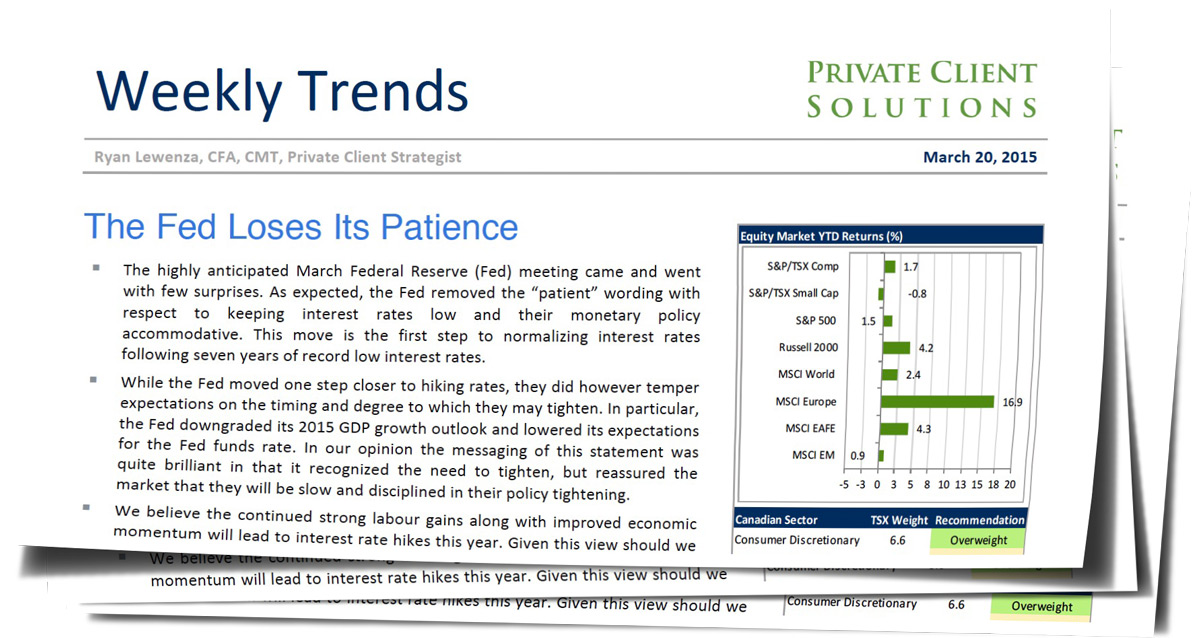Consumers in Hesitation
Recent weakness in U.S. stocks has turned investor attention onto consumer discretionary companies, fueling the sector’s year-to-date outperformance. Will the rally last?
by Russ Koesterich, Portfolio Manager, Blackrock
Diverging monetary policy globally and a stronger U.S. dollar continued to be key drivers of the recent underperformance and last week’s tumble in U.S. stocks. Some investors are reacting to this slump by focusing on domestic consumer stocks, but sluggish retail sales over the past few months are calling this strategy into question. Is the thinking wrong? Read more on my take in my weekly commentary.
Stronger Dollar Hurts U.S. Exporters
It is no coincidence that the U.S. Dollar Index is at a 12-year high, when U.S. stocks are essentially flat year-to-date. A cheaper currency is proving a boon for European and Japanese companies, but the stronger dollar is creating a problem for U.S. exporters by making U.S. goods more expensive. This headwind is further exacerbated by the already high valuations of U.S. stocks.
Without the tailwind of further multiple expansion––that is, investors paying more for each dollar of earnings, something that is harder to achieve with the Fed set to start raising interest rates––the market is left relying on earnings growth, where the rapid rise of the dollar is proving an impediment.
Consumers Not Playing to Script
Given the pressure on exporters and the recent strength in the labor market, it would seem reasonable to focus on companies selling to U.S. consumers. After all, not only are more jobs being created, but in this case, a stronger dollar is a lift to purchasing power. Unfortunately, the reality is not matching the thesis.
In fact, retail sales are struggling, with February being the third consecutive month in which U.S. retail sales fell. Even after stripping out volatile factors, retail sales were still flat. Bad weather probably played a part, which helps explain why online sales were up over 2% as shoppers bought at the keyboard, but tepid income growth shares a large part of the blame. With U.S. consumer discretionary companies outperforming year-to-date, this sector may be vulnerable if sales do not start to accelerate, particularly as the sector sports the second highest valuation of any of the 10 economic sectors.
We upgraded our view on U.S. consumer discretionary stocks last fall and still believe that households are in a better position than they were just a few years ago: Consumer debt is down while household wealth is up, gasoline prices are much lower than a year ago and the U.S. is creating jobs at the fastest pace since the 1990s. However, U.S. consumers are not yet playing to script. While household consumption was strong in the fourth quarter of 2014, it is off to a weak start in 2015. At the same time, consumer stocks have rallied on hopes for a spending rebound. If it does not materialize soon, it may once again be time to pull back from this sector.
Source: Bloomberg
Russ Koesterich, CFA, is the Chief Investment Strategist for BlackRock. He is a regular contributor to The Blog and you can find more of his posts here.
This material represents an assessment of the market environment at a specific time and is not intended to be a forecast of future events or a guarantee of future results. This information should not be relied upon by the reader as research or investment advice regarding the funds or any security in particular.
©2015 BlackRock, Inc. All rights reserved. iSHARES and BLACKROCK are registered trademarks of BlackRock, Inc., or its subsidiaries. All other marks are the property of their respective owners.
iS-15039













